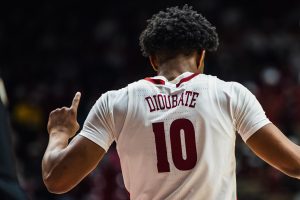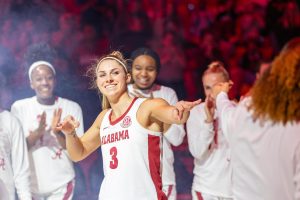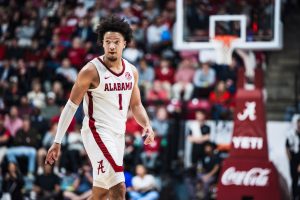Opinion | The pandemic revitalized Tuscaloosa’s music scene
June 15, 2022
When COVID-19 first struck, our lives and reality as we knew it were flipped upside down. In many ways, the pandemic exposed our communities weaknesses, but it also allowed for growth and unity. As individuals began to feel isolation, they turned to new sources of entertainment and connection to each other.
Music served as a creative outlet for both creators and listeners during lockdown. Whether it was a parody song going viral on TikTok or an awaited album, people used music to cope with feelings of isolation. The Tuscaloosa music scene was not exempt from all the changes and challenges that COVID-19 brought along.
The pandemic forced many individuals into isolation, which bred a desire for new digital media and connections. Lockdowns provided musicians with the time and isolation that is needed to create music, leading to the formation of several local bands.
Out of Order, a rock and jam band, was solidified over the shutdown and started playing gigs as venues began to reopen.
Andre Flores, the group’s guitarists, said the band originated from some people he barely knew, but that they “have turned into my absolute best friends in the last year of playing shows together.“
In that way, music became a community builder for local bands during the pandemic, developing shared interests.
“I think for a lot of young musicians COVID was almost an opportunity to dive deeper and provide their full attention to their musical abilities,” Flores said. “My true love for [guitar] really took off during COVID. I was stuck alone with nothing to do but play, and I attribute my reignition and passion to COVID.”
Amberwave, an alt-rock group, started in the midpoint of the pandemic as a group of students looked to fill time taken by COVID with jam sessions.
Will Jefferson, guitarist and bassist for Amberwave, said the pandemic put local bands on the same playing field since a lack of gigs meant everyone had time to focus on improving their work.
“That’s the best time to do what you want to do when you’re on your own,” Jefferson said. “We had eight months of prep before our first performance, so we were able to make sure we delivered a great performance.”
They’re now scheduling their summer similar to the pandemic to create their debut album, Leland Drive, in the Fall.
While individuals continued to join the music scene, its growth came at a time that threatened the nature of local music. The pandemic ravaged performances leaving local artists to fend for themselves. More commercial groups benefited from pre-existing deals, capitalizing on “quarantine albums,” leaving smaller players out of opportunities.
With national and state COVID-19 guidelines restricting public gatherings and a need for distance to remain safe, live music could not exist in the same capacity as it had before. Bars, restaurants and other businesses were stifled as local performers found less opportunities.
After COVID-19 restrictions were lifted in Alabama, several student bands were formed in hopes of establishing themselves in the music scene. Poseidon, Direwolf and Rendezvous are among the several student bands that formed to pass the time during the pandemic.
First Break grew from two friends playing guitar together in 2020 to an energetic rock group frequenting Tuscaloosa’s bars and parties.
Guitar player Nick Kalra said the band was eagerly awaiting new gigs. Two members of the band, Liam Ravita and Erin Kniffin, seek out additional acoustic gigs around the city.
“We love playing and have the utmost gratitude for the people that come out to our shows and reciprocate the excitement we feel going into each and every gig,” Kalra said.
Like other local groups, the reopening of venues presents ample opportunities to grow performances.
The Wheelers, a classic rock and jam band, found their first gig in February 2021 and have been expanding since. They now are a frequent name at local bars and venues while traveling to other performances in Atlanta.
For the past few months, I worked for Poseidon’s merchandise table. This gave me the opportunity to see Tuscaloosa’s local music scene from a new perspective backstage.
My interactions with bands exposed a need for practice space and support. While bands are fortunate to have gained a following among the student body, they lack support from the University. University sponsored events or organization parties could be beneficial to student and local bands.
The pandemic gave musicians an unprecedented amount of time to hone their craft. Prior to the pandemic, the Tuscaloosa music scene was comparable to scenes in smaller cities. After the restrictions were lifted, local groups seized the opportunity to take back Tuscaloosa’s music scene.





















